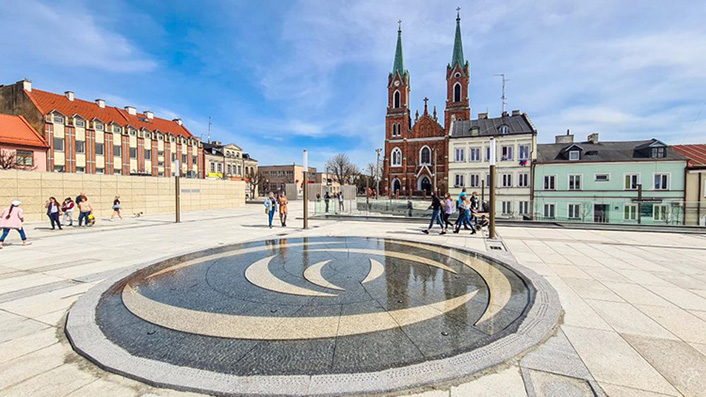HAISYN bus to KUTNO
HAISYN
We do not currently have a description of the town
We do not currently have a description of the town
KUTNO

Kutno is a city located in central Poland, in the province of Lodz, on the Ochnia River. It is one of the larger cities in the region, playing an important role both economically and in terms of communication. Kutno has a rich history, dating back to the Middle Ages, and is an important point on the map of Poland, especially in terms of industry, logistics and culture.
Despite being an industrial city, Kutno also has interesting monuments and sites that can attract tourists:
1. St. Lawrence Church - Built in the 16th century, it is one of the oldest monuments in Kutno. For centuries it has served a religious function and is one of the symbols of the city.
2. Palace of the Dukes of Kutno - Built in the 18th century, the palace was the former residence of the family of the Dukes of Kutno. Today the palace is part of the local cultural infrastructure, and is surrounded by a park.
3. Kutno Regional Museum - This is a place where you can learn about the history of the city and the region. The museum has collections on the history of Kutno, industry and regional culture.
4. Palace and Park Complex in Kutno - A complex of buildings and a park that is a great example of 19th century architecture. There you can see what the landed gentry residences of the time looked like.
5. Jewish Cemetery - Kutno was once home to one of the largest Jewish centers in the region. The Jewish cemetery is one of the places that remind us of the city's multicultural character.
6. City Park - Kutno also has several green areas, the most important of which is the City Park. It is a place of recreation for residents and tourists.
Kutno is also a city with a rich cultural life. Various artistic events, festivals and concerts are regularly held here. Among the most important events are:
- Festival of Roses - held every year in June, which refers to the tradition of gardening and rose breeding in the region. It is one of the most important cultural events in Kutno.
- Kutno Autumn - a festival that presents the artistic achievements of the city's and region's residents.
Kutno is a city located in central Poland, in the province of Lodz, on the Ochnia River. It is one of the larger cities in the region, playing an important role both economically and in terms of communication. Kutno has a rich history, dating back to the Middle Ages, and is an important point on the map of Poland, especially in terms of industry, logistics and culture.
Despite being an industrial city, Kutno also has interesting monuments and sites that can attract tourists:
1. St. Lawrence Church - Built in the 16th century, it is one of the oldest monuments in Kutno. For centuries it has served a religious function and is one of the symbols of the city.
2. Palace of the Dukes of Kutno - Built in the 18th century, the palace was the former residence of the family of the Dukes of Kutno. Today the palace is part of the local cultural infrastructure, and is surrounded by a park.
3. Kutno Regional Museum - This is a place where you can learn about the history of the city and the region. The museum has collections on the history of Kutno, industry and regional culture.
4. Palace and Park Complex in Kutno - A complex of buildings and a park that is a great example of 19th century architecture. There you can see what the landed gentry residences of the time looked like.
5. Jewish Cemetery - Kutno was once home to one of the largest Jewish centers in the region. The Jewish cemetery is one of the places that remind us of the city's multicultural character.
6. City Park - Kutno also has several green areas, the most important of which is the City Park. It is a place of recreation for residents and tourists.
Kutno is also a city with a rich cultural life. Various artistic events, festivals and concerts are regularly held here. Among the most important events are:
- Festival of Roses - held every year in June, which refers to the tradition of gardening and rose breeding in the region. It is one of the most important cultural events in Kutno.
- Kutno Autumn - a festival that presents the artistic achievements of the city's and region's residents.
© 2026 Sindbad
Technical support, assistance, payments: Sindbad IT
© 2026 Sindbad
Technical support, assistance, payments: Sindbad IT